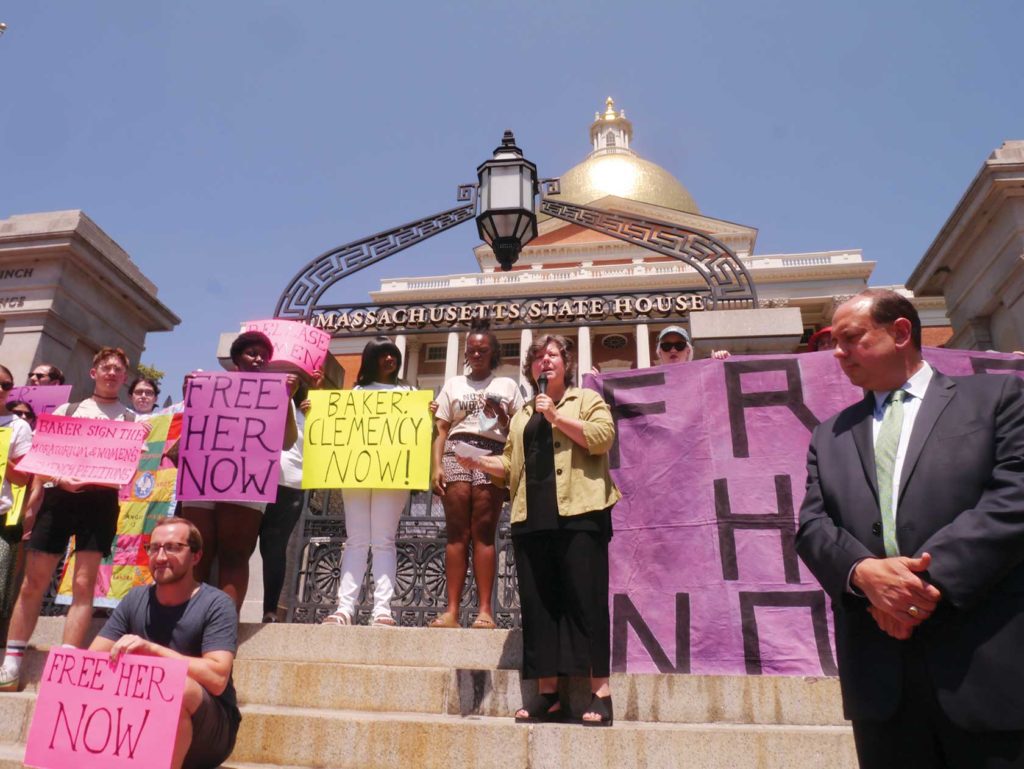Legislature approves moratorium on prisons
Activists call on Gov. Baker to sign bill into law

Several dozen activists rallied in front of the State House last Friday, calling on Gov. Charlie Baker to sign into law legislation that would block the state from building new prisons for the next five years.
“It’s not that women need a fancy pink new prison where they can play with their children,” said Fiona Hoffer, a volunteer organizer with the group Building Up People Not Prisons. “They need to come home.”
State officials have argued that Massachusetts’ sole women’s prison, MCI Framingham, is dilapidated and should be replaced. The prison is the oldest penitentiary in the United States and is widely seen as in need of major renovations.
But the activists who rallied at the State House pointed out that the prison’s population has plummeted from a high of more than 800 down to 160 people in 2021, many of whom are serving time for nonviolent offenses.
State Rep. Chynah Tyler and state Sen. Joanne Comerford filed bills last year calling for a five-year moratorium on prison construction and prison planning in Massachusetts. Last week, Comerford said she would rather see the $50 million the state is proposing to spend on a new women’s prison spent instead on community supports for women, such as affordable housing, drug treatment programs and social services that address the root causes of crime.
“Increasing the carceral footprint doesn’t make sense,” she said. “We know that prisons and jails don’t make crime go down. We know that addressing root causes works.”
Hoffer said the 160 women currently in the Framingham prison should have received better services before they were convicted of crimes.
“Everyone who is incarcerated has been failed in one way or another,” she said. “People have been denied housing. People have been denied mental health service. People deserve all the things that help create healthy communities.”
State Sen. Jamie Eldridge, a co-sponsor of legislation calling for the moratorium, said he and other legislators have toured the Framingham prison.
“The idea is that a prison has the ability to address trauma, that it’s a place for rehabilitation,” he said. “It’s not. It’s a deeply traumatic place.”
As an example of what he would like to see state funding used for, Eldridge pointed to the New Beginnings re-entry services house on Gaston Street in Roxbury, a community-based program that helps women who are involved in the criminal justice system re-integrate into society.
“If one house could house 20 women, why should we build a new prison?” he said. “Study after study shows the efficacy of community-based programs.”
The Roxbury-based criminal justice reform group Families for Justice as Healing began fighting state plans to construct a new prison three years ago, said organizer Sashi James. The group teamed up with the National Council for Incarcerated and Formerly Incarcerated Women and Girls to push for the moratorium.
Last year the groups staged a 90-mile walk across the state to gain support for the moratorium.
“We knocked on doors,” James said. “We passed out fliers. We educated people. We hosted town hall meetings.”
In addition to the moratorium, members of the coalition are calling on the governor to extend clemency to women who are incarcerated.
“The governor and Governor’s Council should grant clemency to all women who are older than 50, women who are sick, women who are survivors of violence, and women who have served more than 10 years,” said Mallory Hanora, director of Families for Justice as Healing, in a statement sent to news media.







